Sleep Apnea Treatments
Steps Towards a Successful OSA Treatment
There are many sleep apnea treatments available today, but not every type of treatment is effective for every patient.
It all depends on the physical examination with your doctor and sleep study results from your sleep test.
In this page you'll learn what are the basic steps to treat obstructive apnea, from the fist signs of your symptoms to choosing your primary treatment.
Basic Stages to Treating Sleep Apnea
1. Diagnosis of Obstructive Apnea
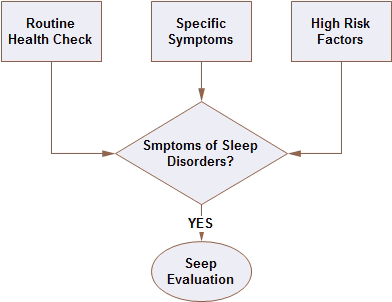
Usually you or your spouse will discover strange symptoms during the night (loud snoring, breathing stops for couple of seconds, gasping for air), and unusual sleepiness during the day.
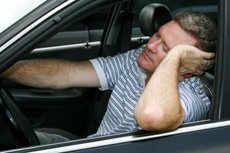 |
Do You Have a Car? Sleeping behind the wheel and even car accidents can be a strong signal that something is definitely wrong and you'll have a good reason to visit your doctor for an evaluation. |
The risk of having OSA is greater if you have the following risk factors:
- Obesity (with a BMI > 35)
- Type 2 Diabetes
- Stroke
- High Blood Pressure
- Congestive Heart Failure
- Arrhythmia.
If your Primary Care Physician observes the symptoms and risk factors described, you will be scheduled for a sleep evaluation.
For more info about risk factors, see causes of sleep apnea.
2. Sleep Evaluation

The evaluation can be done by your family doctor, an ENT or sleep specialist. He will review your sleep history and physical examination.
Your bed partner can be very helpful to answer to some questions related to your behavior during sleep and during the day.
Sleep history include questions such as:
- Do you snore loudly and irregularly? (your partner should know better)
- Do you stop breathing during sleep for a couple of seconds and then you restart breathing?
- Do you start gasping or choking after you restart breathing?
- Are you very sleepy during the day? (you will receive the Epworth Sleepiness Scale test to check your excessive sleepiness)
- Do you have headaches in the morning?
- Do you have problems with memory or concentration during work or school?
Physical Examination consists in checking the presence of:
- obesity
- neck circumference greater > 17 inches in men (> 16 inches in women)
- small or narrow upper airway
- large tongue
- enlarged uvula
- nasal abnormalities
- small jaw
For a quick free test to help diagnosing sleep apnea, see Sleep Apnea Questionnaire.
3. Sleep Study
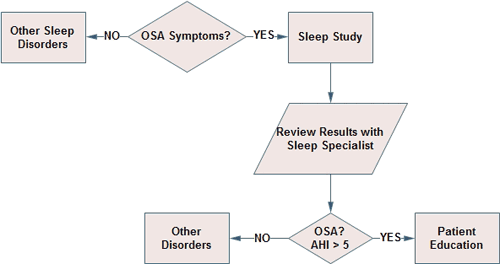
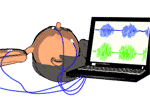
If the sleep evaluation demonstrates you have a high risk of obstructive sleep apnea, the next step will be to confirm the diagnosis and severity in a sleep study. Without a sleep test it will be difficult to know how severe is your OSA and what treatments and settings you need to eliminate it.
There are different types of sleep tests:
- Polysomnography (PSG) - is the standard test for the diagnosis of sleep related breathing disorders.
- Full night test
- Split night test
- Home Testing with Portable Monitors -
- Multiple Sleep Latency Test (MSLT) - if you continue to have excessive sleepiness despite optimal therapy.
For more info about all the methods to test sleep apnea, see Sleep Studies.
4. Sleep Apnea Treatments
The Value of Education
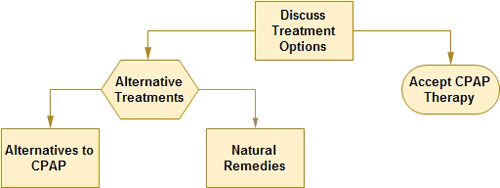
Once you've been diagnosed with obstructive sleep apnea, the sleep specialist should discuss with you the treatment options. In addition, he will explain why do you have OSA and how can you aggravate the condition without even knowing it.
Discovering the Standard Sleep Apnea Treatments
After the sleep study, you'll meet with your doctor to discuss the results and what treatment options are most effective in your case.
This video has one of the most detailed insights regarding sleep apnea treatments:
 Treatment Options for Sleep Apnea
Treatment Options for Sleep Apnea
Currently there are a number of treatment options depending on the severity and type of sleep apnea disorder. There are treatments for:
Types of Sleep Apnea Treatments
Although there are many types of sleep apnea treatments, only after a sleep study your doctor will know which treatment is the most effective for you.
Depending on your risk factors, causes and severity, you may have these options:
- Sleep Apnea Machines (CPAP, BiPAP, APAP, Mechanical Ventilators)
- Surgery
- Dental Devices
- Alternative Treatments
Sleep Apnea Machines
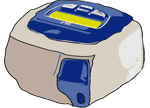
The most effective treatment for sleep apnea (although not so easy to tolerate) is sleeping with a sleep apnea machine are used successfully to treat obstructive apnea, and the most effective machine in majority of the cases is CPAP.
Surgery for Sleep Apnea
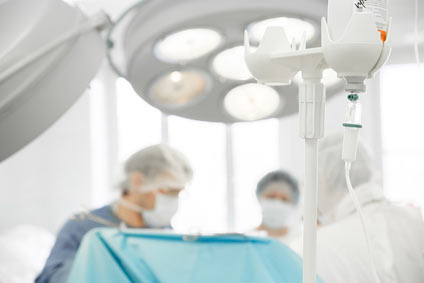
Sleep apnea surgery is another option for treatment.
You probably knows that surgery has many disadvantages, such as:
- pain,
- infection,
- loss of blood,
- tissue damage and other complications.
However, for a person with sleep apnea there is one more risk factor in sleep apnea surgery: general anesthesia.
Why Anesthesia From Surgery Can Be Dangerous?
Anesthetics weakens the breathing reflexes, when a person with sleep apnea has already respiratory difficulty. So it is very important that the surgeon must be aware that you have breathing problems.
Dental Devices

The most common dental appliances for OSA are:
Weight Loss Surgery
Gastric bypass surgery is a type of bariatric surgery that dramatically reduces the size of the stomach. With a smaller stomach, you are physically unable to eat large amounts of food. With less food entering in your body, fat stores begin to be used, and you will star to loose weight.
Bariatric surgery and tracheotomy are the last severe sleep apnea treatment options for morbidly obese patients with Pickwickian Syndrome or who are unable to tolerate positive airway pressure.
Alternative Remedies to Sleep Apnea

Alternative remedies can be efficient if you have problems with breathing machines, surgery or dental devices.
Unfortunately, these alternative treatments can't guarantee effectiveness in severe cases of OSA.
Examples of alternative sleep apnea treatments:
- positional therapy
- tongue exercises for sleep apnea
- throat and jaws exercises
- yoga breathing techniques
- natural remedies, like plants, substances, ayurvedic medicine
- special weight loss diet and exercises for overweight patients
- and other natural solutions, including sleep hygiene and homeopathy.
Medication for Sleep Apnea

Sleep apnea medication may help relieve the excessive sleepiness that sometimes persist with CPAP treatment. Sad to say that is no cure to treat sleep apnea using only with medications.
Weight Loss Strategies
Between sleep apnea and obesity is a strong connection. Breaking this link is a very good way to treat sleep apnea.
You can learn more about the benefits of breaking this link by visiting sleep apnea and weight loss page.
Here's some of my more popular pages:
- CPAP Pillow - the common choice for CPAP users
- What is the best cure for sleep apnea?
- Deviated Septum - a risk factor for apnea syndrome?







